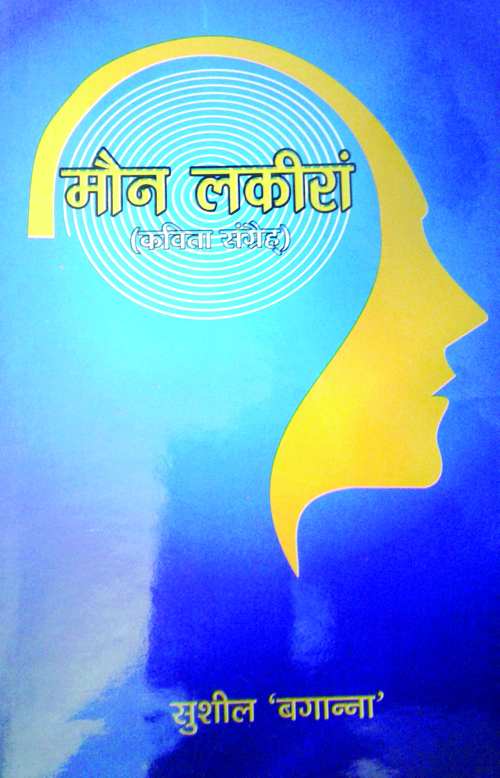Suman K Sharma
Maun Lakeeran (Highbrow Publications, Bari Brahmana, Jammu; 120 pages) is an anthology of 44 Dogri poems of Susheel Beganna. It is the poet’s first published book. Enlarging upon the title, he says in the Preface, ‘Maun Lakeeran (literally, mute lines) are the lines that the mind draws wordlessly on man. Utter gloom prevails within those limits; which would stifle man unless they are broken. Though lying in the sub-conscious, the limits are potent enough to subvert the conscious….But I think that once the power of conscious wakes up, the sub-conscious buckles under its feet. It is then that man achieves redemption. Life becomes a joy. It is then that man starts connecting with the whole universe (p.21).” Beganna’s lines, unlike the mind’s mute lines that he alludes to, speak out the mysteries of self-realisation.
With such sublime and delicate theme running as the common thread to his poems, Beganna is chary of presenting his collection to the reader, much like a doting father giving away his daughter in marriage:
Migi/Meriyan kavitan/Tunde hatthen ch’ saumpde hoi/Eeyan bajhonda ai/Jeeyan kusai Baabal gi/Apni dhee/ghraa bardhande lai/Mehsoos honda ai
-Meriyan Kavitan
Entrusting these my poems in your hands, I feel the same way,
As a father does while sending his daughter away to her in-laws.
In a different vein is the poet’s anxiety about the gathering darkness of the advancing years and the pressing need to set his house in order before it is too late –
Dyodi bherh reejhen di/Khlara saambh cheten da/Ghiri aaye n’ parchhamen/Dhali aae n’ chhore bi
-Parchhamen
Pull the door on desires,
Manage disorderly memories;
The shadows are thickening,
The shades have descended.
It takes him a long endeavour to look inside, perceive what he is; whence not he, but a stranger stares back at him from the mirror –
Ajen sheesha mera khabre/Migi ge opra chetai/ ke men, sadiyen da/ajen aapa tpasha na
-Sheesha
This mirror of mine shows a stranger still
And I’ve been looking for self for eons!
Will obeisance to the houses of worship be of help? No, he says. Going away from self will not rid of man of the mind’s pervading chaos that has blurred his vision.
Chhade mandar maseeten de/Aje toon laar’na gede/Kleje chetna cheti/Mane de taar ni chhede
-Masti
Only of temples and mosques
Are you taking rounds till now,
Your conscious is not awakened
Nor have you begun the songs of mind
But the moment man finds self – the real source of joy – he needs no external support or the dubious sources of momentary pleasure. He himself emanates joy –
Meri bhadaas dosta/Neen saagren di gochri/Booden ch’ karan mokle/Paida toofan mastiyan/Maujen da aks men, manaa/Meri panchhaan mastiyan
-Mastiyan
My craving doesn’t look for goblets,
Raising big storms in mere droplets –
Such are the bouts of my inebriation,
An image of joys am I, O my mind
Joyfulness is how you know of me!
At that stage of the ecstasy, even the simplest act of beholding an innocent smile is nothing short of adoration of the Creator –
Amrat bela/Isgi glaande’n/Pooja da bela/Ashke hassna ge/Sachchi pooja ai
-Amrat Bela
The moment of bliss, that’s what it is
Verily, laughing is the true worship!
Maun Lakeeran does not dwell on spiritualism alone. It also has remarkable poems on a host of topics. Kavita Pchchhai evocatively describes the travails of a poet in these harsh times. Geet is a sonorous call to the angry and the anguished to forsake their crossness and follow the path of love. Tere Fsaane is a touching send-off to a departing year…There is even a poem on the wedding night – Suhaag Raat – which, thanks to the poet’s word-magic, quickens the reader’s heart-beats. Beganna’s language is simple and leaves a telling effect. Says Prof Lalit Magotra in his Foreword to the work: ‘The entry of Susheel Beganna in the field of poetry has personally assured me that Dogri can certainly look forward to a bright future (p.18).’ One couldn’t agree the more with the eminent critic, who is himself a poet of no mean attainment.


